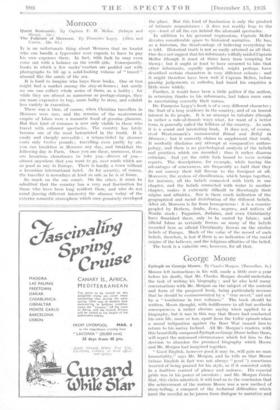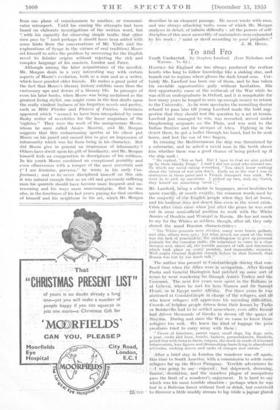George Moore
Epitaph on George Moore. By Charles Morgan. (Macmillan. 5s.) Moon"; left instructions in his will, made a little ovuenerrdaytatr. before his death, that Mr. Charles Morgan should the task of writing his biography ; and he also held many conversations with Mr. Morgan on the subject of the content and form of the proposed book, being particularlY anxious that he should be commemorated by a " true novel," and not by a " tombstone in two volumes:" The book should be written, Moore ,thought, with indifference to all but aesthetic consequences, a rather obscure saying when applied to a biography, but it was in this way that Moore had conducted his own life, more or less, apart from the Celtic episode when a moral indignation against the Boer War caused him to return to his native Ireland: " All Mr. Morgan's readers, with this beautifully composed Epitaph on George Moore before them, will regret the untoward circumstance which led him to the decision to abandon the promised biography which Moore and Mr. Morgan had imagined together.
" Good English, however good it maybe, will gain no man immortality," says Mr. Morgan, and he tells us that Moore (whose English in fact was not always "good ") sometimes Wearied of being praised for his style, as if it consisted solely in a faultless control' of phrase and cadence. His especial pride was in his power of anecdote ; and Mr. Morgan thinks that, this claim admitted, it will lead us to the conclusion thai the achievement of the mature Moore was a new method of Story-telling, a conquest of the technical difficulties which meet the novelist as hepasses from dialogue to narrative and from one plane of consciousness to another, or communi- cates retrospect. Until his coming the attempts had been based on elaborate investigations of the written word, but "with his capacity for observing simple truths that other men pass by " (and perhaps it should have been added with Some hints from the conversations of Mr. Veal's and, the explorations of Synge in the virtues of oral tradition) Moore set himself to solve the problem by recovering for the English novel its fabular origins without rejecting the rich and complex language of his masters, Landor and Pater.,
Although among the later acquaintance of the novelist, Mr. Morgan deals in a very interesting way with certain aspects of Moore's evolution, both as a man and as a writer, which have puzzled older friends. He makes a great point of the fact that Moore's literary history exhibits more than the customary ups and downs of a literary life. In passages of even his later books, when Moore was being acclaimed as the greatest living stylist, one might come in the first drafts upon the really virulent badness of his forgotten novels and poetry, such as Mike Fletcher and Flowers' of Passion. Sentences appeared which "seemed to have been interpolated by some flashy writer of novelettes for the lesser magazines of the 'eighties." They were the work of the unregenerate Moore, whom he once called Amico Moorini, and Mr. Morgan suggests that this embarrassing spectre at his elbow put Moore on his guard and caused him to give an impression of inhumanity which was far from being in his character. But did Moore give in general an impression of inhumanity ? Others have dwelt upon his gift of familiarity, and Mr. Morgan himself feels an exaggeration in descriptions of his coldness. In his youth Moore combined an exceptional geniality and even effusiveness with a temper of the most uncertain sort (" I am feminine, perverse," he wrote in his early Con- fessions); and as he never disciplined • himself on this side it was natural enough that as an old and grievously suffering man hiS quarrels should have become More frequent and un- reasoning and his ways more unaccountable. But he was also, in the loneliness of his last years, paying for that sacrifice of himself and his neighbour to his art, which Mr. Morgan
describes in an eloquent passage. He never-wrote- with -ease, and was always attacking tasks, some of which Mr. Morgan analyses in detail, of infinite difficulty : all the powers of self- discipline of this most unworldly of materialists were exhausted by his work: saint or devil according to your prejudice."
J. M. HONE.















































 Previous page
Previous page